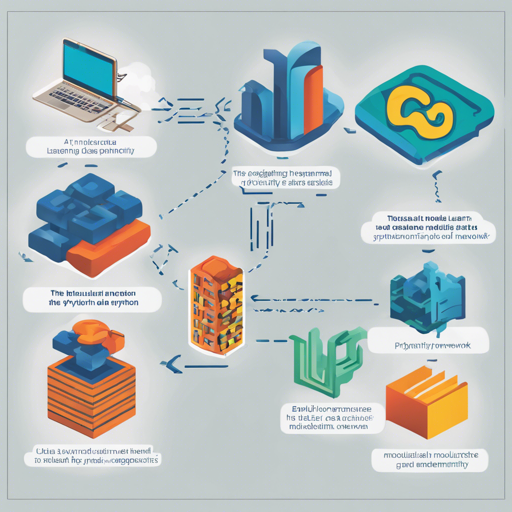Welcome to the enchanting world of active learning! If you’ve ever faced the daunting task of managing vast amounts of unlabeled data, modAL is here to rescue you. This powerful framework, designed for Python3, allows you to create active learning workflows with remarkable flexibility and efficiency.
Introduction
modAL is developed with modularity, flexibility, and extensibility in mind. It builds upon the well-known scikit-learn library, empowering you to craft tailored active learning solutions that suit your specific needs. The fantastic aspect of modAL is its capacity to let you replace components easily, giving you the creative freedom to design innovative algorithms.
Active Learning from a Bird’s Eye View
The world is overflowing with data. This data often comes with the challenge of acquiring labels, which can be labor-intensive and expensive. For example, to interpret the sentiments of tweets, you’d need a substantial labeled dataset. Enter active learning – a framework that enhances classification performance by identifying the most informative instances for labeling. Imagine a scenario where you need to select which unlabeled tweet to label for the best predictive power. Would you choose the tweet amid uncertain sentiments or one you think you can label correctly? Active learning equips you with the tools to make such informed decisions!
In essence, an active learning workflow consists of three fundamental components: the **model** used, the **uncertainty** measure, and the **query** strategy. With modAL, you gain the flexibility to seamlessly integrate various models and customize your query strategies.
modAL in Action
Let’s dive into the practical usage of modAL!
From Zero to One in a Few Lines of Code
Getting started with modAL is as simple as pie. For instance, to utilize a RandomForestClassifier, consider the following code:
from modAL.models import ActiveLearner
from sklearn.ensemble import RandomForestClassifier
# Initializing the learner
learner = ActiveLearner(
estimator=RandomForestClassifier(),
X_training=X_training, y_training=y_training)
# Query for labels
query_idx, query_inst = learner.query(X_pool)
# ... obtaining new labels from the Oracle...
# Supply label for queried instance
learner.teach(X_pool[query_idx], y_new)
This code initiates the learner with your training data and starts querying labels efficiently.
Replacing Parts Quickly
modAL empowers you to swap out default query strategies and uncertainty measures effortlessly. If you wish to utilize classification entropy instead, here’s how:
from modAL.uncertainty import entropy_sampling
learner = ActiveLearner(
estimator=RandomForestClassifier(),
query_strategy=entropy_sampling,
X_training=X_training, y_training=y_training)
Replacing Parts with Your Own Solutions
Custom solutions are just as easy to incorporate! For instance, to design a simple random sampling strategy, check this out:
import numpy as np
def random_sampling(classifier, X_pool):
n_samples = len(X_pool)
query_idx = np.random.choice(range(n_samples))
return query_idx, X_pool[query_idx]
learner = ActiveLearner(
estimator=RandomForestClassifier(),
query_strategy=random_sampling,
X_training=X_training, y_training=y_training)
An Example with Active Regression
In the realm of active regression, let’s take a look at a more intricate example using Gaussian Processes. Imagine we want to learn the noisy sine function:
import numpy as np
X = np.random.choice(np.linspace(0, 20, 10000), size=200, replace=False).reshape(-1, 1)
y = np.sin(X) + np.random.normal(scale=0.3, size=X.shape)
# Custom query strategy
def GP_regression_std(regressor, X):
_, std = regressor.predict(X, return_std=True)
return np.argmax(std)
# Active Learner setup
from modAL.models import ActiveLearner
from sklearn.gaussian_process import GaussianProcessRegressor
from sklearn.gaussian_process.kernels import WhiteKernel, RBF
kernel = RBF(length_scale=1.0) + WhiteKernel(noise_level=1)
regressor = ActiveLearner(
estimator=GaussianProcessRegressor(kernel=kernel),
query_strategy=GP_regression_std,
X_training=X_training.reshape(-1, 1), y_training=y_training.reshape(-1, 1))
# Active learning process
n_queries = 10
for idx in range(n_queries):
query_idx, query_instance = regressor.query(X)
regressor.teach(X[query_idx].reshape(1, -1), y[query_idx].reshape(1, -1))
After a few queries, the model rapidly adapts, enhancing its prediction accuracy!
Additional Examples
To deepen your understanding, explore these additional examples:
- Pool-based sampling
- Stream-based sampling
- Active regression
- Ensemble regression
- Bayesian optimization
- Query by committee
- Bootstrapping and bagging
- Keras integration
Installation
Ready to use modAL? It requires:
- Python = 3.5
- NumPy = 1.13
- SciPy = 0.18
- scikit-learn = 0.18
Install modAL directly with pip:
pip install modAL-pythonOr install from the source:
pip install git+https://github.com/modAL-python/modAL.gitDocumentation
For further insights and tutorials, visit the comprehensive documentation at modAL Documentation.
Troubleshooting Ideas
Here are some common issues you may encounter when using modAL, along with their solutions:
- Issue: Trouble querying labels or integration with your model.
- Solution: Ensure your model is compatible with scikit-learn or Keras, and verify the input data format is consistent.
- Issue: Installing modAL raises errors.
- Solution: Check your Python version and packages listed in the requirements. Use
pip install --upgrade [package-name]to get the latest versions of required libraries.
For more insights, updates, or to collaborate on AI development projects, stay connected with fxis.ai.
About the Developer
modAL is the brainchild of Tivadar Danka, a passionate developer with a PhD in pure mathematics. With a keen interest in biology and machine learning, Tivadar aims to develop active learning strategies for advanced sample analysis. He loves creating innovative solutions that make working in Python efficient.
At fxis.ai, we believe that such advancements are crucial for the future of AI, as they enable more comprehensive and effective solutions. Our team is continually exploring new methodologies to push the envelope in artificial intelligence, ensuring that our clients benefit from the latest technological innovations.

